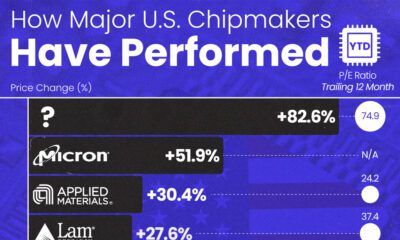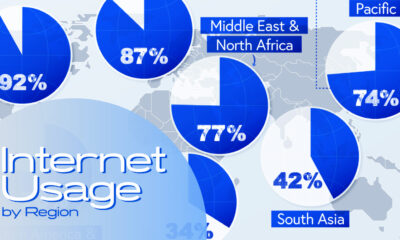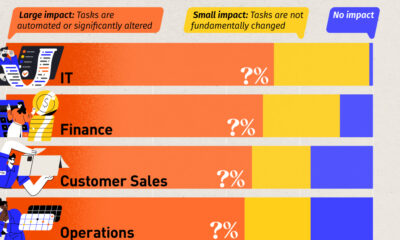Technology
The Skills Needed to Survive the Robot Invasion of the Workplace
Automation is coming to the workplace.
Millions of jobs will be destroyed, but many jobs will also be simultaneously created in the process as well.
For those in the workforce – or for those just joining it for the first time – the big question is: what skills are needed to navigate this monumental shift in the economy? How will humans create value in an increasingly automated world?
The Human Touch
Today’s infographic comes to us from Guthrie Jensen, and it summarizes the skills needed in 2020 and beyond to take advantage of the shifting landscape of work.
In short, for those looking to future proof their careers, building competencies in areas that machines will be unlikely to tackle effectively (i.e. complex problem solving, creativity) is likely the best recipe for success.

It can be daunting to think about automation’s role in the future – but if you’re a bookkeeper, legal secretary, insurance underwriter, credit analyst, or any other person in a job with high automation potential, it would be prudent to be thinking long and hard about what you can offer beyond your existing set of skills and competencies.
Here’s just a quick look at automation potential of select positions, according to a study by Oxford University:
| Position | Chance of Automation | Position | Chance of Automation | |
|---|---|---|---|---|
| Telemarketer | 99% | Physician | 0.4% | |
| Tax Preparer | 99% | Dentist | 0.4% | |
| Insurance Underwriter | 99% | Computer Systems Analyst | 0.7% | |
| Bookkeeping Clerk | 98% | Registered Nurse | 0.9% | |
| Legal Secretary | 98% | Teacher | 1.0% | |
| Credit Analyst | 98% | Microbiologist | 1.2% | |
| Loan Officer | 98% | Pharmacist | 1.2% | |
| Real Estate Broker | 97% | Sales Manager | 1.3% | |
| Payroll Clerk | 97% | Engineer | 1.4% | |
| Accountant | 94% | CEO | 1.5% | |
| Budget Analyst | 94% | PR Manager | 1.5% | |
| Pharmacy Technician | 92% | Architect | 1.8% |
So how do we set ourselves up for future success in a world where even real estate brokers are likely to be automated?
It Starts With Soft Skills
There are many considerations for career success during a time of significant change.
However, there’s a good case that skills – especially soft skills – are the most important foundation to build upon. These include things like the ability to communicate and work well with others, solve problems, and think outside of the box, as well as other aspects of emotional intelligence.
Here are some skills that experts say should be prioritized:
1. Complex Problem Solving
It’s true that AI can solve problems that humans cannot – but it also goes the other way. When problem solving needs to span multiple industries or when problems are not fully defined, humans can work backwards to figure out a solution.
2. Critical Thinking
Machines are getting better at aspects of critical thinking, but humans are still able to to connect, interpret and imagine concepts in a world full of ambiguity and nuance. A lawyer can pinpoint the exact positioning to make a case for a client, or a marketer can figure out an overarching message that can resonate with consumers.
3. Creativity
Creativity requires a degree of intuitive randomness that can not yet be imitated by AI. Why did the architect design the building a certain way, and why did the musician improvise by playing a chord out of key? It’s hard to explain why to a computer – it just feels right.
Other important soft skills to consider?
People management, coordinating with others, decision-making, negotiation, and serving others will all be important going forward as well.
Technology
Ranked: Semiconductor Companies by Industry Revenue Share
Nvidia is coming for Intel’s crown. Samsung is losing ground. AI is transforming the space. We break down revenue for semiconductor companies.
Semiconductor Companies by Industry Revenue Share
This was originally posted on our Voronoi app. Download the app for free on Apple or Android and discover incredible data-driven charts from a variety of trusted sources.
Did you know that some computer chips are now retailing for the price of a new BMW?
As computers invade nearly every sphere of life, so too have the chips that power them, raising the revenues of the businesses dedicated to designing them.
But how did various chipmakers measure against each other last year?
We rank the biggest semiconductor companies by their percentage share of the industry’s revenues in 2023, using data from Omdia research.
Which Chip Company Made the Most Money in 2023?
Market leader and industry-defining veteran Intel still holds the crown for the most revenue in the sector, crossing $50 billion in 2023, or 10% of the broader industry’s topline.
All is not well at Intel, however, with the company’s stock price down over 20% year-to-date after it revealed billion-dollar losses in its foundry business.
| Rank | Company | 2023 Revenue | % of Industry Revenue |
|---|---|---|---|
| 1 | Intel | $51B | 9.4% |
| 2 | NVIDIA | $49B | 9.0% |
| 3 | Samsung Electronics | $44B | 8.1% |
| 4 | Qualcomm | $31B | 5.7% |
| 5 | Broadcom | $28B | 5.2% |
| 6 | SK Hynix | $24B | 4.4% |
| 7 | AMD | $22B | 4.1% |
| 8 | Apple | $19B | 3.4% |
| 9 | Infineon Tech | $17B | 3.2% |
| 10 | STMicroelectronics | $17B | 3.2% |
| 11 | Texas Instruments | $17B | 3.1% |
| 12 | Micron Technology | $16B | 2.9% |
| 13 | MediaTek | $14B | 2.6% |
| 14 | NXP | $13B | 2.4% |
| 15 | Analog Devices | $12B | 2.2% |
| 16 | Renesas Electronics Corporation | $11B | 1.9% |
| 17 | Sony Semiconductor Solutions Corporation | $10B | 1.9% |
| 18 | Microchip Technology | $8B | 1.5% |
| 19 | Onsemi | $8B | 1.4% |
| 20 | KIOXIA Corporation | $7B | 1.3% |
| N/A | Others | $126B | 23.2% |
| N/A | Total | $545B | 100% |
Note: Figures are rounded. Totals and percentages may not sum to 100.
Meanwhile, Nvidia is very close to overtaking Intel, after declaring $49 billion of topline revenue for 2023. This is more than double its 2022 revenue ($21 billion), increasing its share of industry revenues to 9%.
Nvidia’s meteoric rise has gotten a huge thumbs-up from investors. It became a trillion dollar stock last year, and broke the single-day gain record for market capitalization this year.
Other chipmakers haven’t been as successful. Out of the top 20 semiconductor companies by revenue, 12 did not match their 2022 revenues, including big names like Intel, Samsung, and AMD.
The Many Different Types of Chipmakers
All of these companies may belong to the same industry, but they don’t focus on the same niche.
According to Investopedia, there are four major types of chips, depending on their functionality: microprocessors, memory chips, standard chips, and complex systems on a chip.
Nvidia’s core business was once GPUs for computers (graphics processing units), but in recent years this has drastically shifted towards microprocessors for analytics and AI.
These specialized chips seem to be where the majority of growth is occurring within the sector. For example, companies that are largely in the memory segment—Samsung, SK Hynix, and Micron Technology—saw peak revenues in the mid-2010s.
-

 Real Estate2 weeks ago
Real Estate2 weeks agoVisualizing America’s Shortage of Affordable Homes
-

 Technology1 week ago
Technology1 week agoRanked: Semiconductor Companies by Industry Revenue Share
-

 Money2 weeks ago
Money2 weeks agoWhich States Have the Highest Minimum Wage in America?
-

 Real Estate2 weeks ago
Real Estate2 weeks agoRanked: The Most Valuable Housing Markets in America
-

 Business2 weeks ago
Business2 weeks agoCharted: Big Four Market Share by S&P 500 Audits
-

 AI2 weeks ago
AI2 weeks agoThe Stock Performance of U.S. Chipmakers So Far in 2024
-

 Misc2 weeks ago
Misc2 weeks agoAlmost Every EV Stock is Down After Q1 2024
-

 Money2 weeks ago
Money2 weeks agoWhere Does One U.S. Tax Dollar Go?














